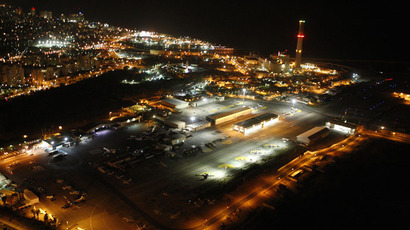Israel’s ‘illegal’ military entry permit bars selected tourists from West Bank - report

Many tourists hoping to visit the West Bank are finding it impossible to do so – because Israel requires certain visitors to have an entry permit. Obtaining permission is anything but easy, because Tel Aviv doesn't explain the process, Haaretz reported.
The requirement for military entry permits reportedly began at
the beginning of 2013. However, not everyone is required to obtain
the special pass – and no information has been published
surrounding the selection process.
Clerics from the US reportedly had to sign a declaration at
Ben-Gurion International Airport recently, promising not to enter
Area A without permits from the Coordinator of Government
Activities in the Territories (COGAT). Area A includes all
Palestinian cities and their surrounding areas, with no Israeli
settlements. The area is fully controlled by the Palestinian
Authority.
COGAT is a military office which coordinates civilian issues
between the Israeli government, the Israel Defense Forces,
international organizations, diplomats, and the Palestinian
Authority.
"I understand that in the event that I enter any area under the
control of the Palestinian Authority without the appropriate
authorization all relevant legal actions will be taken against me,
including deportation and denial of entry into Israel for a period
of up to ten years," the English-language version of the
declaration reads.

The clerics signed the document, but were not told how they could obtain the special permission.
The clerics told Haaretz that they had been sent from their church to work with Christian communities in East Jerusalem and the West Bank. But their mission ended before it ever began because they were not told how to obtain the military entry permit.
One of the clerics sought help from the US Consulate in Jerusalem – but none of the employees were aware of the restictions. The spokesman for the US consulate declined to answer whether Israel had informed the American authorities about the obligation to sign a statement, and did not explain the viewpoint of the US Department of State.

According to Sabine Haddad, a spokeswoman for Israel’s Population, Immigration and Borders Authority, the Entry into Israel Law authorizes the interior minister to decide on the entry of foreigners to the State of Israel. In the case of Judea and Samaria, the Israel Defense Forces chief of general staff makes the determination with a permit from the coordinator’s office.
“When a tourist or foreign national arrives at the international border crossings and it is believed that he wants to enter Judea and Samaria, he should be informed [of the procedure] and asked for his promise to receive a permit from the coordinator’s office before his entry – a permit that constitutes an essential condition [of entry to the Palestinian Authority controlled areas]," she said.
But there is no mention of the existence of such a procedure on
COGAT's English website. The spokesman for the coordinator's office
said the matter of the procedure and the form is being
examined.
Meanwhile, lawyers are questioning the legality of the declaration. According to the Oslo Accords, citizens of countries which have diplomatic ties with Israel need only an entry permit for Israel and a valid passport to enter Palestinian Authority territories, Attorney Adi Lustigman said.

The declaration “is not legal because it was formulated for an improper purpose – isolating the occupied territories – and in an improper manner. It makes the assumption that people who arrive in Israel as tourists, as clerics and for other purposes want to act in contradiction to the law, which may not have been explained to them clearly,” Lustigman said.
“If there really is such a procedure, it should be publicized in a simple, clear and accessible manner...it seems there is no operative procedure, nor any procedure for submitting a request. We are left only with a prohibition, which, as we have mentioned, is invalid,” she added.
The practice of requiring tourists to sign such declarations was first reported seven years ago, but was reportedly discontinued and renewed only at the beginning of this year.
Several years ago, the Interior Ministry also began to limit the
freedom of movement of tourists with work and family ties in the
West Bank, in order to prevent their entry into Israel by means of
a permit with the stamp “For the territories of Judea and Samaria
only.”















